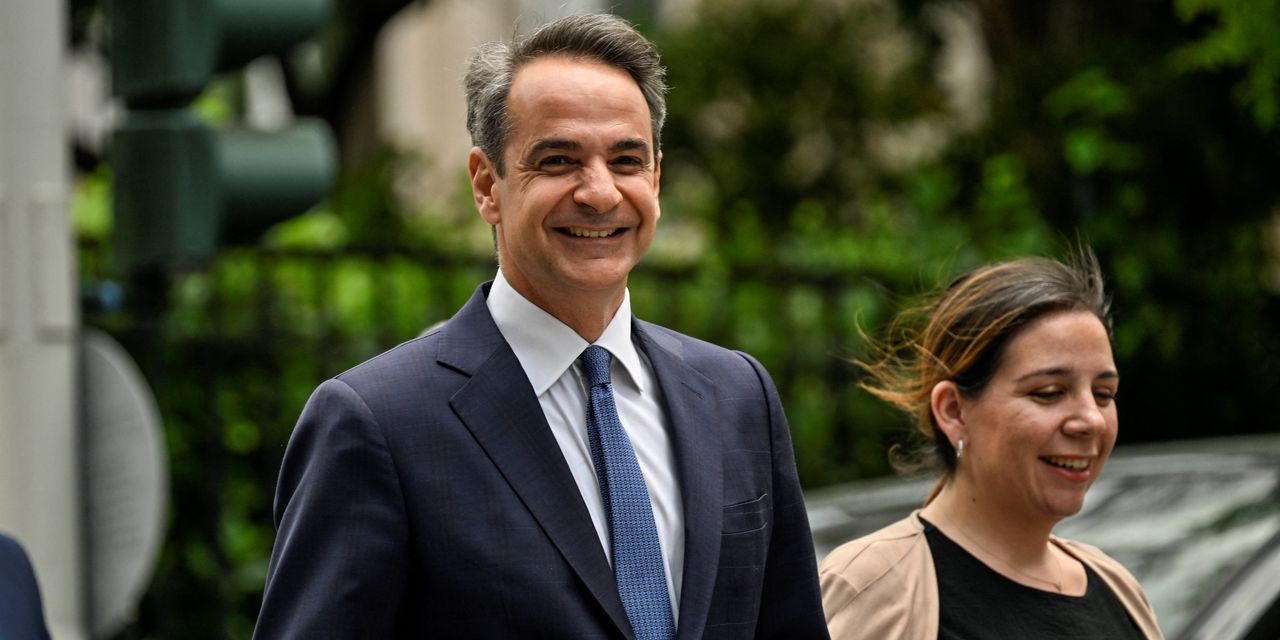American investors probably haven’t given Greece much thought since the catastrophic financial crisis that rocked the country for a decade after 2008. The birthplace of democracy deserves another look, and not just as a vacation destination.
Once Europe’s sick man, Greece has had an impressive economic recovery under Prime Minister Kyriakos Mitsotakis, with growth exceeding expectations and unemployment and inflation in decline. This revival led Mitsotakis’ center-right New Democracy party to a surprising electoral landslide on May 21, notwithstanding scandals that might otherwise have darkened its prospects. The party is expected to win a second election that could see it command a significant majority.
This Mediterranean miracle holds lessons for the U.S., which has been mired in a political fight over the federal debt ceiling and is grappling with its worst inflation in a generation.
Greece’s prospects looked far from certain in the aftermath of the 2008-09 financial crisis, and excessive sovereign debt brought the government to the brink of default in 2015. A string of bailouts and a restructuring couldn’t avert what became the longest recession for any advanced capitalist economy, exceeding even the Great Depression in the U.S.
An austerity regime put more than a third of Greeks at risk of poverty, sent unemployment above 27%, and caused a brain drain as hundreds of thousands left the country. Greece also came close to abandoning the euro.
Mitsotakis’ ascent in 2019 offered something different: technocratic leadership from a Harvard University–educated former Chase banker and McKinsey consultant. His New Democracy party cut taxes, raised the minimum wage, boosted pensions, and lured foreign investment from the likes of
Microsoft
(ticker: MSFT) and
Pfizer
(PFE). These policies help to turn things around.
Greece’s gross domestic product was just 86% of 2008 levels at the end of 2022, but GDP growth of 14.5%, year over year, was almost double that of the wider euro zone. Unemployment has fallen below 11% from 18.6% at the start of 2019. And an annual inflation rate of just 3% is enviably low, although core inflation measures, excluding food and energy, remain troubling.
True, Mitsotakis took office after the brunt of the postcrisis pain, and a lot of the GDP and labor-market gains owe to resurgent tourism, which boosted the services sector, even as domestic consumption lagged. A pandemic-era loosening of fiscal rules in the European Union also helped, but the formulation of tighter new regulations is a risk.
Reducing Greece’s bloated debt remains a battle. The country’s debt-to-GDP ratio was 171% at the end of last year, but had fallen from 195% in 2021 and more than 200% in 2020. While inflation has provided a tailwind in trimming this ratio, Mitsotakis deserves credit for overseeing growth and instilling greater fiscal discipline. Under his watch, Greek also paid off its debts to the International Monetary Fund two years ahead of schedule.
For voters, the positive economic news has overshadowed scandals that pollsters predicted would hurt the New Democracy party going into the May elections. These included new legal restrictions on the press, a wiretapping scheme targeting politicians and prominent figures, and a February train crash that killed 57 and sparked mass protests and allegations that state mismanagement had contributed to the disaster.
“The main concern of the Greek electorate has been to secure growth,” says Paolo Pizzoli, a senior economist at ING with a focus on Greece.
New Democracy scored its widest victory since 1974 against Syriza, Greece’s other prominent political party, winning 41% of the vote versus Syriza’s 20%. A second election is likely in June or July, with Mitsotakis expected to secure majority rule under a system granting the winner extra seats.
“The push for reforms will have to be kept very high,” says Pizzoli, arguing that there isn’t “much room for complacency.”
The most timely conclusion to draw from Greece’s success is the importance of spending discipline and default avoidance. Not only did Greece face intense social unrest in the years when it flirted with a debt default and endured austerity measures, but its debt crisis also sparked volatility across markets, including in U.S. stocks. Its path from economic chaos to greater fiscal responsibility offers a timely lesson for the U.S., which has a debt-to-GDP ratio of 120%, and where politicians are fighting over the debt ceiling and federal spending.
Greece’s example also illustrates economic confidence’s importance to markets and elections. The likelihood of a Mitsotakis majority sent stocks and bonds surging in the past week, with spreads narrowing between yields on Greek government debt and a German benchmark, as markets focused on the prospect of Greece’s return to an investment-grade credit rating.
On the social front, the election upset reaffirmed that “it’s the economy, stupid.” And that issue might well overshadow America’s culture wars as U.S. voters head to the polls in 2024.
While there are huge differences between the world’s largest economy and that of a small European nation, with a population about as big as North Carolina’s, the U.S. can still learn from Greece’s odyssey. Plus, with the economy on the mend, Greece’s fabled tourist attractions shine brighter, too.
Write to Jack Denton at [email protected]
Read the full article here




